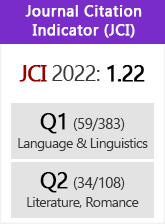Tradition and originality in a Ruiz de Alarcón’ comedy
DOI:
https://doi.org/10.3989/rfe.2008.v88.i2.54Keywords:
Ruiz de Alarcón, No hay mal que por bien no venga, Don Domingo de don Blas, Alfonso III, folkloric tale, Sephardic, Arab, middle Ages poemAbstract
The third act of the comedy No hay mal que por bien no venga, or Don Domingo de don Blas, written by Juan Ruiz de Alarcón at the end of his life, is built on a tale —disappeared in Europe— in which an angel orders the King to steal, so he learns that he is to be killed. We can find Sephardic and Arab versions in Northern Africa; during the Middle Ages, it originated a poem about Charlemagne. Here it refers to an historical try to remove Alfonso III from the throne (X century).
Downloads
Download data is not yet available.
Downloads
Published
2008-12-30
How to Cite
Fradejas Lebrero, J. (2008). Tradition and originality in a Ruiz de Alarcón’ comedy. Revista De Filología Española, 88(2), 279–295. https://doi.org/10.3989/rfe.2008.v88.i2.54
Issue
Section
Articles
License
Copyright (c) 2008 Consejo Superior de Investigaciones Científicas (CSIC)

This work is licensed under a Creative Commons Attribution 4.0 International License.
© CSIC. Manuscripts published in both the printed and online versions of this Journal are the property of Consejo Superior de Investigaciones Científicas, and quoting this source is a requirement for any partial or full reproduction.All contents of this electronic edition, except where otherwise noted, are distributed under a “Creative Commons Attribution 4.0 International” (CC BY 4.0) License. You may read here the basic information and the legal text of the license. The indication of the CC BY 4.0 License must be expressly stated in this way when necessary.
Self-archiving in repositories, personal webpages or similar, of any version other than the published by the Editor, is not allowed.














